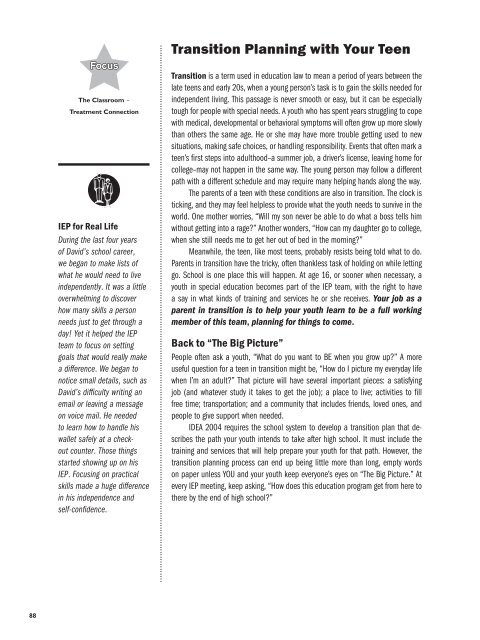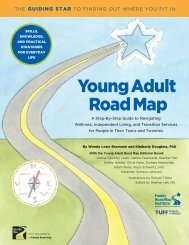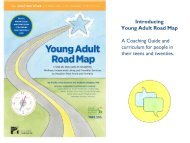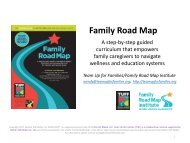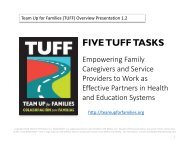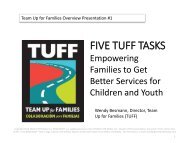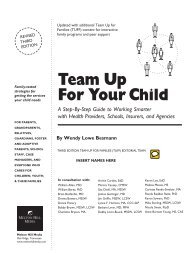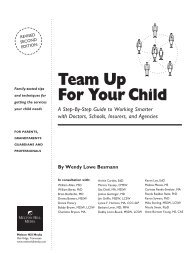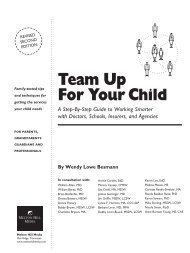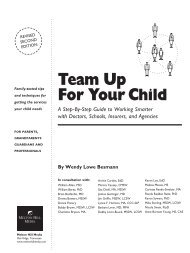Family Road Map Guide
You also want an ePaper? Increase the reach of your titles
YUMPU automatically turns print PDFs into web optimized ePapers that Google loves.
Focus<br />
The Classroom –<br />
Treatment Connection<br />
IEP for Real Life<br />
During the last four years<br />
of David’s school career,<br />
we began to make lists of<br />
what he would need to live<br />
independently. It was a little<br />
overwhelming to discover<br />
how many skills a person<br />
needs just to get through a<br />
day! Yet it helped the IEP<br />
team to focus on setting<br />
goals that would really make<br />
a difference. We began to<br />
notice small details, such as<br />
David’s difficulty writing an<br />
email or leaving a message<br />
on voice mail. He needed<br />
to learn how to handle his<br />
wallet safely at a checkout<br />
counter. Those things<br />
started showing up on his<br />
IEP. Focusing on practical<br />
skills made a huge difference<br />
in his independence and<br />
self-confidence.<br />
Transition Planning with Your Teen<br />
Transition is a term used in education law to mean a period of years between the<br />
late teens and early 20s, when a young person’s task is to gain the skills needed for<br />
independent living. This passage is never smooth or easy, but it can be especially<br />
tough for people with special needs. A youth who has spent years struggling to cope<br />
with medical, developmental or behavioral symptoms will often grow up more slowly<br />
than others the same age. He or she may have more trouble getting used to new<br />
situations, making safe choices, or handling responsibility. Events that often mark a<br />
teen’s first steps into adulthood–a summer job, a driver’s license, leaving home for<br />
college–may not happen in the same way. The young person may follow a different<br />
path with a different schedule and may require many helping hands along the way.<br />
The parents of a teen with these conditions are also in transition. The clock is<br />
ticking, and they may feel helpless to provide what the youth needs to survive in the<br />
world. One mother worries, “Will my son never be able to do what a boss tells him<br />
without getting into a rage?” Another wonders, “How can my daughter go to college,<br />
when she still needs me to get her out of bed in the morning?”<br />
Meanwhile, the teen, like most teens, probably resists being told what to do.<br />
Parents in transition have the tricky, often thankless task of holding on while letting<br />
go. School is one place this will happen. At age 16, or sooner when necessary, a<br />
youth in special education becomes part of the IEP team, with the right to have<br />
a say in what kinds of training and services he or she receives. Your job as a<br />
parent in transition is to help your youth learn to be a full working<br />
member of this team, planning for things to come.<br />
Back to “The Big Picture”<br />
People often ask a youth, “What do you want to BE when you grow up?” A more<br />
useful question for a teen in transition might be, “How do I picture my everyday life<br />
when I’m an adult?” That picture will have several important pieces: a satisfying<br />
job (and whatever study it takes to get the job); a place to live; activities to fill<br />
free time; transportation; and a community that includes friends, loved ones, and<br />
people to give support when needed.<br />
IDEA 2004 requires the school system to develop a transition plan that describes<br />
the path your youth intends to take after high school. It must include the<br />
training and services that will help prepare your youth for that path. However, the<br />
transition planning process can end up being little more than long, empty words<br />
on paper unless YOU and your youth keep everyone’s eyes on “The Big Picture.” At<br />
every IEP meeting, keep asking, “How does this education program get from here to<br />
there by the end of high school?”<br />
88


